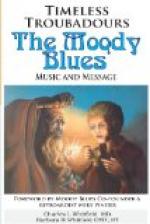The troubadours as a rule stood aloof from the religious quarrels of the age. But few seem to have joined the crusaders, as Perdigon did. Most of their patrons were struggling for their existence: when the invaders succeeded in establishing themselves, they had no desire for court poetry. The troubadour’s occupation was gone, and those who wished for an audience were obliged to seek beyond the borders of France. Hence it [83] is somewhat remarkable to find the troubadour Raimon de Miraval, of Carcassonne, continuing to sing, as though perfect tranquillity prevailed. His wife, Gaudairenca, was a poetess, and Paul Heyse has made her the central figure of one of his charming Troubadour Novellen. Raimon’s poems betray no forebodings of the coming storm; when it broke, he lost his estate and fled to Raimon of Toulouse for shelter. The arrival of Pedro II. of Aragon at Toulouse in 1213 and his alliance with the Count of Toulouse cheered the troubadour’s spirits: he thought there was a chance that he might recover his estate. He compliments Pedro on his determination in one poem and in another tells his lady, “the king has promised me that in a short time, I shall have Miraval again and my Audiart shall recover his Beaucaire; then ladies and their lovers will regain their lost delights.” Such was the attitude of many troubadours towards the crusade and they seem to represent the views of a certain section of society. There is no trace on this side of any sense of patriotism; they hated the crusade because it destroyed the comforts of their happy existence. But the South of France had never as a whole acquired any real sense of nationalism: there was consequently no attempt at general or organised resistance and no leader to inspire such [84] attempts was forth-coming.
On the other hand, special districts such as Toulouse, showed real courage and devotion. The crusaders often found much difficulty in maintaining a force adequate to conduct their operations after the first energy of the invasion had spent itself, and had the Count of Toulouse been an energetic and vigorous character, he might have been able to reverse the ultimate issue of the crusade. But, like many other petty lords his chief desire was to be left alone and he was at heart as little interested in the claims of Rome as in the attractions of heresy. His townspeople thought otherwise and the latter half of the Chanson de la Croisade reflects their hopes and fears and describes their struggles with a sympathy that often reaches the height of epic splendour. Similarly, certain troubadours were by no means absorbed in the practice of their art or the pursuit of their intrigues. Bernard Sicart de Marvejols has left us a vigorous satire against the crusaders who came for plunder, and the clergy who drove them on. The greatest poet of this calamitous time is Peire Cardenal. His work falls within the years 1210 and 1230. The short notice that we have of him says that he




